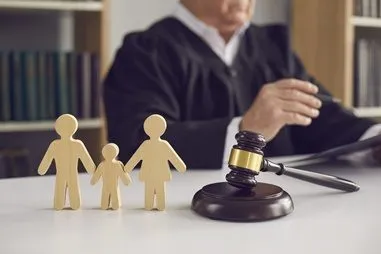
Thepenalties for domestic violencego far beyond fines and jail sentences. A parent who has been accused of abuse in the home could suffer a loss to their reputation, career impediments, and even custody of their children. When the court makes a decision about temporary or permanent child custody, the judge will consider evidence of past or present abuse committed by one parent toward an intimate partner or toward the child.
Since the function of the court is to do whatever is in the best interest of the child, judges rarely give an abusive parent legal or physical custody. However, the rightcriminal defense attorneycan argue your case and provide evidence to prove that the child will be safe with you.
Types of Domestic Abuse Considered in Child Custody Cases
Domestic violence can refer to many kinds of abuse committed by one family member against another. In a custody case, the judge must consider whether your behavior qualifies you as an “abusive parent.” To meet this definition, you would either have had to commit a serious incident of abuse or have repeatedly committed acts of abuse.
In a custody case, a “serious incident of abuse” means:
- Causing serious bodily injury
- Attempting to cause serious bodily injury
- Placing someone in reasonable fear of imminent and serious bodily harm
- Forcing or threatening someone into performing sexual relations against their will
- The child was conceived by rape and the parent was convicted of the rape
A judge is also unlikely to place a child with a parent who has demonstrated a pattern of abuse, such as one or more of the following:
- Attempting to cause physical injury
- Actually causing physical injury
- Placing someone in reasonable fear of imminent physical injury
For a free legal consultation, call (781) 740-0800
Can a Parent Accused of Domestic Violence Ever Get Custody of a Child?
The likelihood of your being given custody depends on the specifics of your case, such as the type and extent of the alleged abuse and the evidence you present in your defense. For example, the court may consider:
- Allegations alone.A parent doesn’t need to provide the family court with proof of abuse (such as medical records, arrests, or protection orders) to make an allegation of domestic violence. An accusation that rests solely on the account of the alleged victim may have less of an impact than one backed by evidence.
- 209A Orders.If the court has issued a 209A Abuse Prevention Order against you, the judge must consider it when determining custody arrangements. While these restraining orders alone are not enough proof that a certain level of abuse occurred, the specific restrictions on the order (such as forbidding you to contact the other parent or the child) may result in the other parent getting sole legal or physical custody.
- Abuse on both sides.If both parents have a history or suspicion of abuse, custody may be given to the parent who poses the least threat of harm to the child. For example, a parent who has completed a batterer’s treatment program may be a better fit than a parent whose anger is due to ongoing substance abuse. If the judge places a child with an abusive parent, they must explain in writing why the custody order is in the best interest of the child.
- Conviction.A conviction of domestic abuse can weigh heavily on your custody case, and can result in the denial of both custody and visitation rights. It’s up to you to prove to the court that visitation is in the child’s best interests. An attorney can help you retain contact with your child by requesting conditional visitation, such as supervised visits or prohibiting overnight stays.
At Nate Amendola Defense, we have helped numerous clients overcome accusations of domestic assault. Our attorneys will do everything we can to preserve your rights as a parent and prevent charges of domestic violence from ruining your life.Contact ustoday to set up a confidential consultation and have us get started on building your best defense.
Call or text (781) 740-0800 or complete a Free Case Evaluation form


